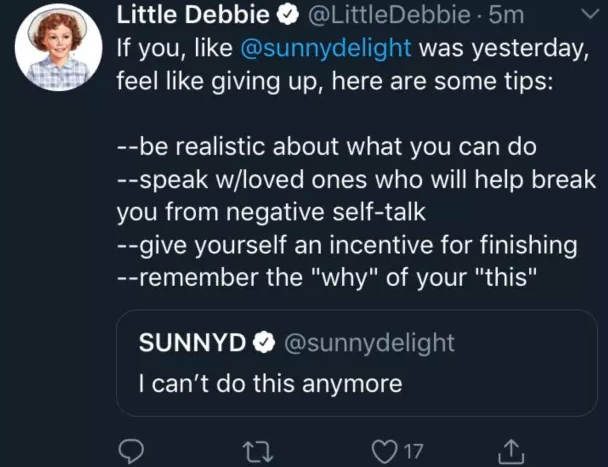At 9:24 PM, in the middle of Super Bowl LIII, SunnyD tweeted, "I can't do this anymore." The cry appeared to be in reference to how insufferably boring the big game was, but responses of faux alarm, many from other major companies, immediately started flooding in.
Pornhub offered a tissue, Pop-Tarts a hug, Little Debbie, in a since-deleted tweet, tips to address clinical depression. Because if you stripped the sentence from its context, naturally, it looked as if the orange-flavored drink was potentially suicidal.
Advertisement

The internet promptly got upset. Eater, the AV Club, and Quartz rightly questioned the ethical boundary that's crossed when brands use depression as a viable marketing strategy. Still, the outrage is merely part of the expected cycle; what's more puzzling is why. Why are real human beings searching for, or at the very least expect, meaning from a brand's social media presence? Have we nowhere else to look? What does it signify that a culture, particularly a young, American one, is so thirsty for help that it'll not only drink enough Sonic Limeades a year to allegedly fill 50 Olympic-size swimming pools, but that it'll also seek them out for information on their horoscopes?"Brands now behave like real people with idiosyncratic personalities on social media platforms," Adam Alter, a marketing and psychology professor at New York University, wrote to me in an email, adding that it's been one way for them, over the past five years or so, "to stand out in a crowded marketplace." But "this humanization of brands," he continued, "means we've come to expect small doses of humanity from even large brands that may have once seemed faceless and corporate before the rise of social media."In 2019, we're definitely not short on examples of brands jockeying to "stand out in a crowded marketplace." The media has already recognized their new-fangled anthropomorphic attempts: We revel in the ridiculousness (there are countless lists of the "funniest brands to follow on Twitter"), poke fun at it, and complain or critique it. More specifically: Eater had noted that depression was a popular advertising stunt in 2018, calling attention to when Steak-umm—the cheap, frozen, thin-sliced meat you throw on a frying pan—acknowledged that it sucks to be young; when parody accounts, like Nihilist Arby's, began to spring up; and when Wendy's really dropped a mixtape on Spotify titled We Beefin?—an allusion to the persona it's developed as being a shit-stirrer on Twitter. (Sometimes with Burger King.)
Advertisement
It is all absurd, but it is reality. And it's a tricky thing to navigate. Twitter basically operates as a collection of inside jokes that build on one another. It's a medium that's held up by so much irony, snark, and meta-awareness it's hard to know what's remotely sincere. It's a forum that encourages bombast, and to add to Alter's earlier assertion, in order for these sorts of brands to differentiate themselves, "they have to simultaneously stand out and not offend," Eugene Soltes, an associate professor of business administration at Harvard Business School, told me.Currently, a more traditional way brands can get noticed, of course, is to take a stance on a social issue. (It's how you wind up with a Nike ad starring Colin Kaepernick, and a massive razor company pondering toxic masculinity.) Twitter, though, isn't quite the same as a multimillionaire-dollar advertisement campaign that has a calculated purpose to provoke dialogue around the product. Depending on your perspective, it demands much quicker thinking, or much less thought. Really, it's a type of marketing, John Paul Rollert, an assistant professor of behavioral science at the University of Chicago's Booth School of Business, insisted to me was "spontaneous and improvisational."In other words, brands have to "sound appropriate on the platform," Brandon Rhoten, the chief marketing officer at Potbelly Sandwich, and formerly the CMO for Papa John's and the vice president of marketing for Wendy's, said to me on the phone. James Bennett, the current senior director of media, social, and partnerships of Wendy's, noted to me, too, that "speed has to be part of this consideration." Twitter requires a degree of trust that's previously been unfathomable in advertising: To be cool, brands have to juggle between not giving a shit and avoiding scandal for their flippancy. Those that strike the right balance see an engagement much more personal than the type brands previously had with the public.
Advertisement
John Hooker, a professor of business ethics, social responsibility, and operations at Carnegie Mellon University, referenced in an email our "steady retreat from rationality over the last few decades," and that "we have forgotten our tradition of ethical reasoning." All of "this has led," he concluded, "to [a] lack of moral clarity, and sometimes efforts to find it in strange places."Now, we understand that behind every brand's social account is a person. And part of the problem with brands becoming increasingly more human on Twitter is that it can potentially be unclear, sometimes, if it's the individual's voice or the brand's. Or, to quote my co-worker Trey Smith, the social media editor for VICE's music site Noisey:
Nathan Allebach, the 27-year-old who runs Steak-umm's weird Twitter, would apparently agree. A couple of months ago he told the online magazine MEL: "The end of the day, these tweets are just coming from my brain. I'm just firing them off." His approach reportedly has helped sell significantly more of the meat, and the voice he's adopted comes off more authentic than others—like, say, the on-your-nose hipness of Taco Bell. He's even had kids DM the Steak-umm account about how "they don't know what to go to college for," or "they don't know what to do as career." He told the Ringer, too, that "when you're trying to actually build a brand from the ground up, it's a lot easier to do that when you're speaking as first person because people who are interacting, connecting with the brand itself, they feel connected to the people or the person behind it." Corporations may not be people—but there are, certainly, people on the other side of their social media accounts.
Advertisement
(Allebach and Steak-umm declined to comment for this article, as did many of the numerous food and beverage companies I reached out to. Both Pop-Tarts and Little Debbie declined as well. Representatives for SunnyD did not respond.)The first-person, singular perspective is emblematic of this larger point. Before Twitter, there was not such a human-like interaction between brands and actual people—where boxed, processed cattle was alluding to its anxiety and responding to DMs; where a fast-food establishment was promoting its curated playlist; where an orange drink was accidentally hinting at its all-consuming depression. There's still a visible blurriness between whose tweets we're precisely reading—the brand or the people behind the brand—and this is surely not the last time, intentional or not, a sugary drink will commodify our sadness, or we'll jump to conclusions about the emotions of the people running a certain account. These lines are still being drawn, and it's anyone's guess as to how much they'll be moved.But, for now, as John Paul Rollert, the University of Chicago professor, said in summary: "It can't say anything good about society when depressed people feel their best outlet is the Twitter account for Steak-umm."Sign up for our newsletter to get the best of VICE delivered to your inbox daily.Follow Alex Norcia on Twitter.
